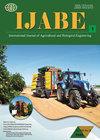Effect of temperature on the leaching of heavy metals from nickel mine tailings in the arctic area, Norway
IF 2.2
2区 农林科学
Q2 AGRICULTURAL ENGINEERING
International Journal of Agricultural and Biological Engineering
Pub Date : 2023-01-01
DOI:10.25165/j.ijabe.20231602.7216
引用次数: 1
Abstract
: The leaching of heavy metals from tailings deposit due to the oxidation of sulphidic tailings and formation of acidic leachate is considered a high risk to the surrounding environment. Temperature plays an important role in the leaching of heavy metals from tailings in changing acid-based environment, especially in the Arctic area. To investigate how the temperature variation affected metal release from tailings in the Arctic area, a series of column leaching experiments was conducted under four temperature situations (5°C, 10°C, 14°C and 18°C). Physicochemical properties, Fe, Zn, Ni and Mn concentrations of leachates at each cycle were measured, and multivariate statistical analysis was applied to research the effect of temperature on heavy metals leaching from tailings in the Arctic area. The results showed that higher temperatures encouraged tailings to oxidation and sulfuration of and promoted heavy metal release from the tailings through precipitation and erosion. Ni, Zn and Mn have similar releasing resources from tailings and positive correlation in the leaching activity. Rising temperature accelerated Fe leaching; Fe leaching promoted leaching of the other metals, especially of Mn. Appropriately increase temperature will accelerate oxidization and sulfidization of the tailings, promote acid generation and increase TDS and, finally, promote the release of heavy metals. Climate change, with rising temperatures increasing the risk of heavy metals leaching from the tailings, should be given greater attention. Keeping tailings away from the appropriate temperature and in a higher alkalinity is a good method to control the leaching of heavy metals from tailings.温度对挪威北极镍矿尾矿中重金属浸出的影响
硫化物尾矿氧化,形成酸性渗滤液,导致尾矿库中重金属的浸出,对周围环境构成高风险。在不断变化的酸基环境中,特别是在北极地区,温度对尾矿中重金属的浸出起着重要的作用。为了研究温度变化对北极地区尾矿中金属释放的影响,在5℃、10℃、14℃和18℃四种温度条件下进行了一系列柱浸试验。测定各循环下渗滤液的理化性质及Fe、Zn、Ni、Mn浓度,并应用多元统计分析研究温度对北极地区尾矿中重金属浸出的影响。结果表明:较高的温度促进了尾矿的氧化硫化,促进了尾矿中重金属的沉淀和侵蚀释放;镍、锌、锰从尾矿中释放资源相似,且浸出活性呈正相关。升温加速铁浸出;铁的浸出促进了其他金属的浸出,尤其是锰的浸出。适当升高温度会加速尾矿的氧化硫化,促进产酸,增加TDS,最终促进重金属的释放。气候变化,随着气温上升,重金属从尾矿中浸出的风险增加,应该给予更多的关注。控制尾矿中重金属的浸出,在适当的温度和较高的碱度下进行处理是一种很好的方法。
本文章由计算机程序翻译,如有差异,请以英文原文为准。
求助全文
约1分钟内获得全文
求助全文
来源期刊

International Journal of Agricultural and Biological Engineering
AGRICULTURAL ENGINEERING-
CiteScore
4.30
自引率
12.50%
发文量
88
审稿时长
24 weeks
期刊介绍:
International Journal of Agricultural and Biological Engineering (IJABE, https://www.ijabe.org) is a peer reviewed open access international journal. IJABE, started in 2008, is a joint publication co-sponsored by US-based Association of Agricultural, Biological and Food Engineers (AOCABFE) and China-based Chinese Society of Agricultural Engineering (CSAE). The ISSN 1934-6344 and eISSN 1934-6352 numbers for both print and online IJABE have been registered in US. Now, Int. J. Agric. & Biol. Eng (IJABE) is published in both online and print version by Chinese Academy of Agricultural Engineering.
 求助内容:
求助内容: 应助结果提醒方式:
应助结果提醒方式:


